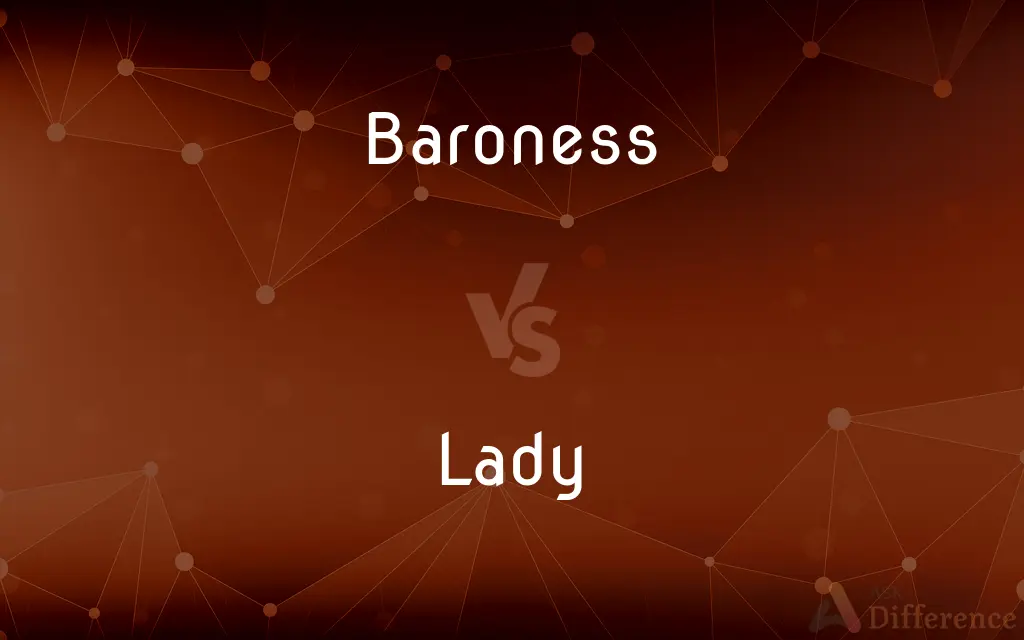Baroness vs. Lady — What's the Difference?
Edited by Tayyaba Rehman — By Urooj Arif — Updated on March 18, 2024
Baroness refers to a noblewoman of the lowest rank in British peerage, while Lady is a general title for any woman of high social rank or courtesy title.

Difference Between Baroness and Lady
Table of Contents
ADVERTISEMENT
Key Differences
Baroness is a title specific to certain European nobility systems, particularly in the UK, denoting a woman who holds her rank in her own right or by marriage to a baron. It is the female equivalent of a baron, positioned at the lowest rank of the British peerage. Whereas Lady is a broader term that can refer to any woman of high social standing or respect. It is also used as a courtesy title for the wives and daughters of certain nobility ranks.
The title of Baroness is associated with specific legal and social privileges, including a seat in the House of Lords for life peeresses. On the other hand, the term Lady does not confer any specific legal rights but is used as a form of address for women of the aristocracy or those married to knights and baronets.
In terms of usage, Baroness is a formal title that is prefixed to the first name or full name, such as Baroness Thatcher. Lady, however, can be used both formally and informally, and is often prefixed to the surname, especially for the wives of knights and baronets, e.g., Lady Smith.
While the title of Baroness is inherited or bestowed upon an individual by the monarch, becoming a Lady can be a result of birth, marriage, or royal appointment. The criteria for these titles are distinctly outlined in the British peerage system.
The significance and recognition of the title Baroness are primarily within the United Kingdom and territories where British peerage is acknowledged. Lady, as a term, enjoys a broader international recognition and is often used in various contexts beyond the confines of nobility.
ADVERTISEMENT
Comparison Chart
Rank
Lowest rank in British peerage
General title for women of high social rank
Conferment
By inheritance or monarch's appointment
By birth, marriage, or royal appointment
Legal Rights
Specific legal and social privileges
No specific legal rights
Usage
Formal, prefixed to name (Baroness Thatcher)
Formal/informal, prefixed to surname (Lady Smith)
International Recognition
Primarily in the UK and its territories
Broad international recognition
Compare with Definitions
Baroness
Comes with certain legal and social benefits.
As a Baroness, she has access to specific parliamentary rights.
Lady
Can indicate nobility or mere respect.
Lady Gaga chose her stage name for its powerful connotations.
Baroness
Can hold her title in her own right or by marriage.
Baroness Grey-Thompson is admired for her contributions to sports and charity.
Lady
Applies to wives and daughters of lords and knights.
Lady Mary Crawley is the fictional character in a period drama.
Baroness
Often granted a life peerage, allowing a seat in the House of Lords.
Baroness Amos serves in the House of Lords.
Lady
Used for women of high social standing or nobility.
Lady Diana Spencer was beloved worldwide.
Baroness
Used with the first name or full name.
Baroness Kennedy of The Shaws is known for her legal reforms.
Lady
Recognized beyond the confines of nobility.
Lady Hamilton became a famous figure in history through her actions.
Baroness
A noblewoman of the lowest rank in British peerage.
Baroness Young was an influential figure in politics.
Lady
Does not entail specific legal rights.
Lady Byrne volunteers in her local community without any special legal status.
Baroness
The wife of a baron.
Lady
A woman of high social standing or refinement, especially when viewed as dignified or well-mannered.
Baroness
The wife or widow of a baron.
Lady
A woman who is the head of a household
Is the lady of the house at home?.
Baroness
A woman holding the title to a barony.
Lady
A woman, especially when spoken of or to in a polite way
Ladies, may I show you to your table?.
Baroness
Used as the title for such a noblewoman.
Lady
Used as a form of address for a woman, often with sarcasm or irritation
Look, lady, I was ahead of you in line.
Baroness
A woman holding a baronial title in her own right; a female ruler of a barony.
Lady
A woman who is the object of romantic or chivalrous love
A knight serving his lady.
Baroness
A baron's wife; also, a lady who holds the baronial title in her own right; as, the Baroness Burdett-Coutts.
Lady
(Informal) A wife or girlfriend
A man kissing his lady at the airport.
Baroness
A noblewoman who holds the rank of baron or who is the wife or widow of a baron
Lady
A lady in waiting
The queen and her ladies.
Lady
A general feminine title of nobility and other rank, specifically as the title for the wife or widow of a knight or baronet.
Lady
Used as a form of address for a woman of high rank, especially for a marchioness, countess, viscountess, baroness, or baronetess.
Lady
Lady The Virgin Mary. Usually used with Our.
Lady
(historical) The mistress of a household.
Lady
A woman of breeding or higher class, a woman of authority.
"I would like the dining room to be fully set by tonight; would you do so?" "Yes, my lady".
Lady
The feminine of lord.
Lady
A title for someone married to a lord or gentleman.
Lady
A title that can be used instead of the formal terms of marchioness, countess, viscountess, or baroness.
Lady
(in the plural) A polite reference or form of address to women.
Ladies and gentlemen, it is a pleasure to be here today. Follow me, ladies!
Lady
(slang) Used to address a female.
Hey, lady, move your car!
Hey, ladies, how are you doing?
Lady
(ladies' or ladies) Toilets intended for use by women.
Lady
(informal) A wife or girlfriend; a sweetheart.
Lady
A woman to whom the particular homage of a knight was paid; a woman to whom one is devoted or bound.
Lady
(slang) A queen the playing card.
Lady
Who is a woman.
A lady doctor.
Lady
(Wicca) Lady.
Lady
(archaic) gastric mill, the triturating apparatus in the stomach of a lobster, consisting of calcareous plates; so called from a fancied resemblance to a seated female figure.
Lady
A five-pound note. (Rhyming slang, Lady Godiva for fiver.)
Lady
A queen.
Lady
To address as “lady”.
Lady
A woman who looks after the domestic affairs of a family; a mistress; the female head of a household.
Agar, the handmaiden of Sara, whence comest thou, and whither goest thou? The which answered, Fro the face of Sara my lady.
Lady
A woman having proprietary rights or authority; mistress; - a feminine correlative of lord.
Of all these bounds, even from this line to this, . . . We make thee lady.
Lady
A woman to whom the particular homage of a knight was paid; a woman to whom one is devoted or bound; a sweetheart.
The soldier here his wasted store supplies,And takes new valor from his lady's eyes.
Lady
A woman of social distinction or position. In England, a title prefixed to the name of any woman whose husband is not of lower rank than a baron, or whose father was a nobleman not lower than an earl. The wife of a baronet or knight has the title of Lady by courtesy, but not by right.
Lady
A woman of refined or gentle manners; a well-bred woman; - the feminine correlative of gentleman.
Lady
A wife; - not now in approved usage.
Lady
Any woman; as, a lounge for ladies; a cleaning lady; also used in combination; as, saleslady.
Lady
The triturating apparatus in the stomach of a lobster; - so called from a fancied resemblance to a seated female figure. It consists of calcareous plates.
Lady
Belonging or becoming to a lady; ladylike.
Lady
A polite name for any woman;
A nice lady at the library helped me
Lady
A woman of refinement;
A chauffeur opened the door of the limousine for the grand lady
Lady
A woman of the peerage in Britain
Common Curiosities
Can a woman become a Baroness on her own?
Yes, a woman can be a Baroness in her own right through inheritance or royal appointment.
Is Lady a title of nobility?
Lady is a courtesy title for women of high social rank, but it can also be used more broadly as a sign of respect.
Is Lady used for all women of nobility?
Lady is used for wives and daughters of lords, knights, and baronets, but it's also a term of respect for women in general.
Can a Baroness sit in the House of Lords?
Yes, life peeresses who are Baronesses have the right to sit in the House of Lords.
Are there differences in rights between a Baroness and a Lady?
Yes, a Baroness has specific legal and social privileges, whereas Lady does not confer legal rights.
How is a woman made a Baroness?
A woman can be made a Baroness either by inheritance or by being appointed by the monarch.
What is the international significance of the title Lady?
The title Lady is recognized internationally, often associated with respect and high social status.
How does one address a Baroness?
A Baroness is addressed by prefixing "Baroness" to her first name or full name.
Can a Lady have a title by marriage?
Yes, a woman can use the title Lady by marrying a knight or baronet.
Are there any ceremonial duties for a Lady?
While not legally mandated, Ladies often partake in social and ceremonial duties due to their status.
Can a Lady be involved in politics?
Yes, Ladies can be involved in politics, though their title does not grant them any specific political rights or roles.
How does one become a Lady in the UK?
In the UK, becoming a Lady typically involves birth, marriage to a knight or baronet, or a royal appointment.
Do Baronesses have a role in the government?
Baronesses, especially life peeresses, can have a role in the government through their position in the House of Lords.
Can the title of Baroness be passed on to children?
The title of Baroness can be hereditary, passing to the next eligible family member under certain conditions.
What is the main difference between a Baroness and a Lady?
The main difference is that Baroness is a specific rank within the British peerage, with legal privileges, while Lady is a broader title used for respect and courtesy.
Share Your Discovery

Previous Comparison
Anorak vs. Parka
Next Comparison
Expert vs. AnalystAuthor Spotlight
Written by
Urooj ArifUrooj is a skilled content writer at Ask Difference, known for her exceptional ability to simplify complex topics into engaging and informative content. With a passion for research and a flair for clear, concise writing, she consistently delivers articles that resonate with our diverse audience.
Edited by
Tayyaba RehmanTayyaba Rehman is a distinguished writer, currently serving as a primary contributor to askdifference.com. As a researcher in semantics and etymology, Tayyaba's passion for the complexity of languages and their distinctions has found a perfect home on the platform. Tayyaba delves into the intricacies of language, distinguishing between commonly confused words and phrases, thereby providing clarity for readers worldwide.
















































